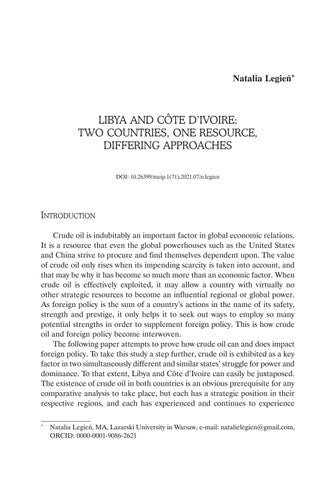Natalia Legień*
LIBYA AND CÔTE D’IVOIRE: TWO COUNTRIES, ONE RESOURCE, DIFFERING APPROACHES DOI: 10.26399/meip.1(71).2021.07/n.legien
INTRODUCTION Crude oil is indubitably an important factor in global economic relations. It is a resource that even the global powerhouses such as the United States and China strive to procure and find themselves dependent upon. The value of crude oil only rises when its impending scarcity is taken into account, and that may be why it has become so much more than an economic factor. When crude oil is effectively exploited, it may allow a country with virtually no other strategic resources to become an influential regional or global power. As foreign policy is the sum of a country’s actions in the name of its safety, strength and prestige, it only helps it to seek out ways to employ so many potential strengths in order to supplement foreign policy. This is how crude oil and foreign policy become interwoven. The following paper attempts to prove how crude oil can and does impact foreign policy. To take this study a step further, crude oil is exhibited as a key factor in two simultaneously different and similar states’ struggle for power and dominance. To that extent, Libya and Côte d’Ivoire can easily be juxtaposed. The existence of crude oil in both countries is an obvious prerequisite for any comparative analysis to take place, but each has a strategic position in their respective regions, and each has experienced and continues to experience *
Natalia Legień, MA, Lazarski University in Warsaw, e-mail: natalielegien@gmail.com, ORCID: 0000-0001-9086-2621




